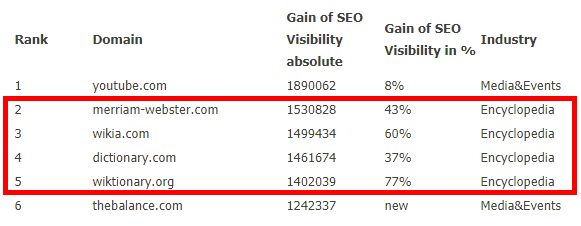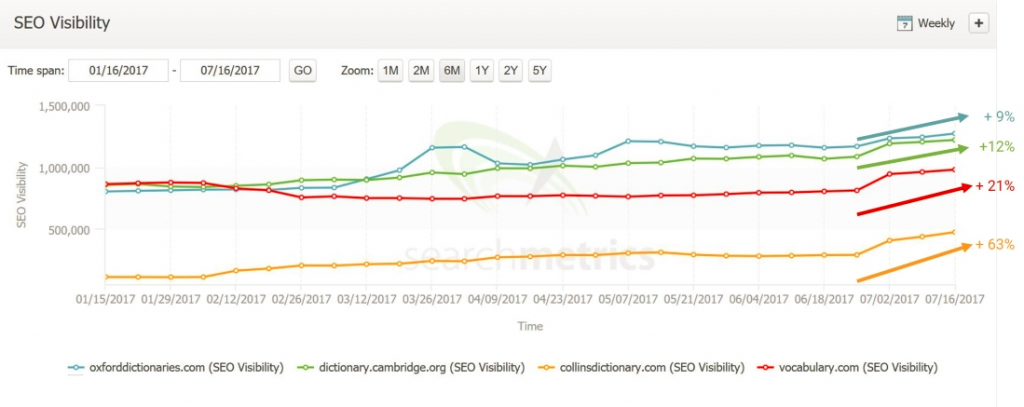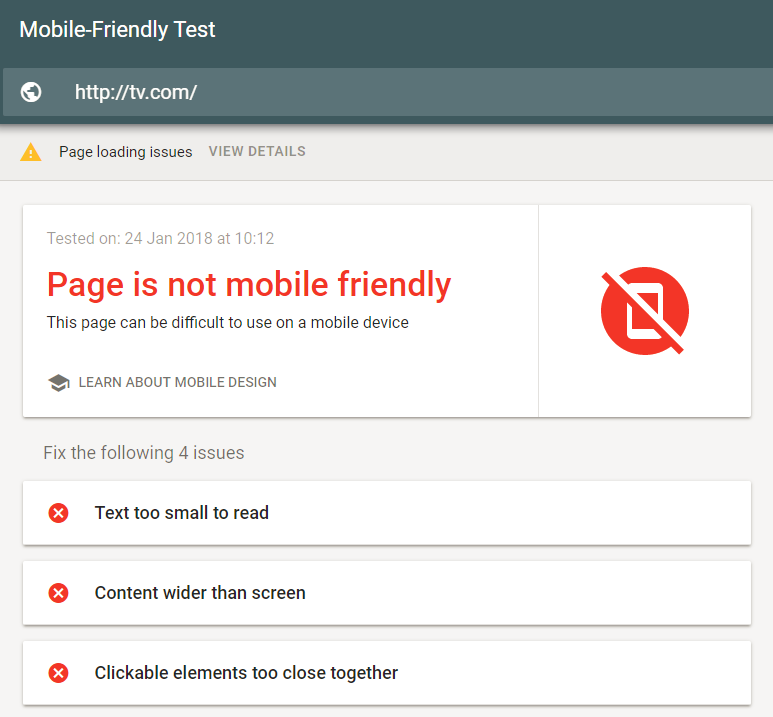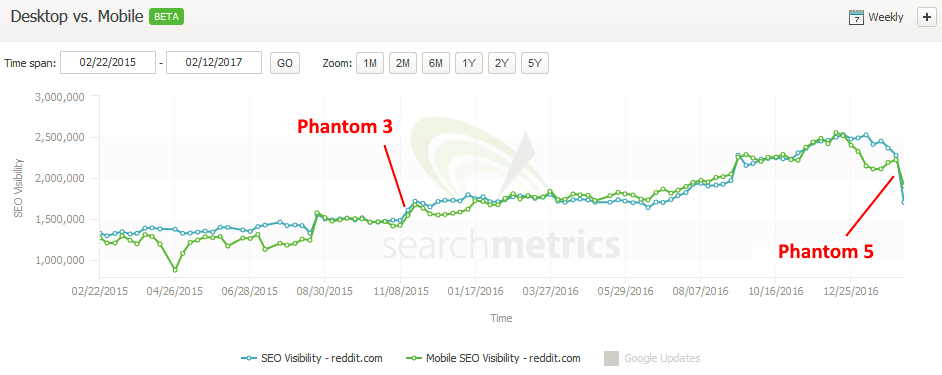Earlier this week, Searchmetrics published its fourth annual Winners and Losers Report, which reveals how certain sites fared in organic search visibility on Google.com during 2017.
Searchmetrics bases its analysis on a unique indicator known as ‘SEO visibility’, which it uses to measure a webpage’s performance in organic search.
This is not the same as organic search ranking, but aims to give an overview of how often a website shows up in search results, based on “search volume and the position of ranking keywords” (as explained in the Searchmetrics FAQ).
Using this metric, Searchmetrics calculates the change in websites’ SEO visibility over the course of the year, and sorts the top 100 winners and losers by absolute change in visibility.
Last year, we examined the winners and losers in organic search during 2016, and concluded that social media and shopping were the overall “winners”, while online encyclopedias, reference websites and lyrics websites all lost out.
How do the results from this year stack up against last year, and what can we learn from the trends highlighted?
Encyclopedias and dictionaries are back on top
In a surprising reversal of 2016’s fortunes, online encyclopedias and dictionaries were among some of the biggest “winners” in 2017.
Encyclopedias made up 9% of the overall winners by industry, with websites like britannica.com, thesaurus.com and collinsdictionary.com enjoying triple-digit percentage gains in SEO visibility. Of the top five domains ranked by gain in absolute SEO visibility, four were dictionary or encyclopedia websites: Merriam Webster, Wikia, Dictionary.com and Wiktionary.
This is a huge change from last year, when social networking websites dominated the top five; out of last year’s top five “winners”, only YouTube is still on top, rising up the ranks from fourth to first place.
Searchmetrics attributes this miraculous change in fortune to an algorithm update in June 2017 dubbed the “dictionary update”. Dictionary websites had been slowly gaining in visibility since the beginning of the year, but over the three-week period between 25th June and 16th July, they saw an even more notable uptick:
Dictionary websites saw a boost from Google’s “Dictionary update” in June and July 2017
Searchmetrics noted that dictionary URLs particularly improved their ranking for short-tail keywords with ambiguous user intent – suggesting that Google might be examining whether the users searching these terms could be looking for definitions.
I would speculate that Google could also be promoting fact-based reference websites as part of its ongoing efforts to battle fake news and dubious search results – but this is purely speculation on my part.
The trend is also not borne out by Wikipedia, which continues to see its SEO visibility drop as more Knowledge Graph integrations appear for its top keywords, allowing users to see key information from Wikipedia without bothering to click through to the site – and possibly preventing those pages in Wikipedia from ranking.
The losers lost out more on mobile
One very interesting trend highlighted in Searchmetrics’ findings is the fact that domains which lost out in 2017 saw even bigger drops on mobile than on desktop.
Domains which started out the year with roughly equal desktop and mobile visibility closed out the year with their mobile visibility far below that of desktop. For example, TV.com’s mobile visibility was 41% below its desktop visibility by the end of 2017, while perezhilton.com’s mobile visibility was 42% lower than desktop, and allmusic.com was 43% lower.
Without going behind the scenes at Google’s search index, it’s hard to know exactly what the cause could be. TV.com decidedly fails Google’s Mobile-Friendly Test, but perezhilton.com and allmusic.com both pass. Because Searchmetrics is measuring organic search visibility, these drops may not be due to a lower SERP ranking, but could be due to the websites not appearing for as many search queries on mobile.
What isn’t surprising is that in 2017, we began to see much bigger differences between the way search behaves on mobile and the way it behaves on desktop. Back in August, we looked at the results of a BrightEdge study which found that 79% of all keywords ranked differently in mobile search compared to desktop.
At the time, we speculated that this was due to tests on Google’s part to prepare for the upcoming mobile-first index. Just two months later, Google’s Gary Illyes announced at SMX East that the mobile-first index had in fact already begun rolling out, albeit very slowly.
2017 was the year that we truly started to see mobile search on Google diverge from desktop, and in 2018 we’ve already had confirmation of a major upcoming change to Google’s mobile algorithm in July, after which point page speed will officially be a ranking factor on mobile. So to say that mobile and desktop search results will continue to diverge further in 2018 seems like a very safe prediction to make.
So long, social media?
Possibly the most curious change in fortune between 2016 and 2017 was seen with social media websites, which were among some of the biggest winners in 2016 and some of the biggest losers in 2017.
Visual social network Pinterest went from being the second-biggest ‘winner’ in terms of absolute search visibility in 2016 to suffering a 23% visibility loss in 2017. Similarly, discussion forum Reddit saw a 54% drop in visibility in 2017 after having been the 8th biggest ‘winner’ in 2016.
Tumblr and Myspace also experienced significant losses, and while Facebook and Twitter (#3 and #6 in 2016, respectively) weren’t among the “losers” highlighted by Searchmetrics in 2017, they also appeared nowhere in the list of “winners”.
It’s hard to say exactly why this would be. In last year’s study, Searchmetrics attributed Pinterest’s huge gains in visibility to its “application of deep-learning techniques” to understand user intent, “thereby generating more loyalty and stickiness online”. Whether Pinterest has slowed its progress on this front, or whether other shifts in Google’s index have caused its visibility to suffer, is unknown.
Reddit, meanwhile, appears to have suffered at the hands of Google’s “Phantom V” update, with visibility dropping off sharply at the beginning of 2017. Its mobile visibility was particularly low going in to 2017, which Searchmetrics tentatively attributes to technical issues with the mobile version of its website.
Reddit’s visibility drops off as Phantom V hits in February 2017
It could be that the losses in visibility suffered by social media websites in 2017 are due to differing circumstances and not part of a wider trend, but it’s an interesting coincidence nonetheless.
What can we learn from the “winners” and “losers” of 2017?
Many of the changes of fortune experienced by websites in 2017 were the result of a specific Google update. Phantom V was spotted in the SERPs in mid-February, sending a number of brands’ domains yo-yoing up and down. Google Fred hit not long afterwards, affecting ad-heavy websites with low-quality content and poor link profiles.
Another key change of note is the User Localization Update of October 2017, in which Google started showing search results based on users’ physical location regardless of the Top-Level Domain (.com, .co.uk, .fr) they might be using to search – a big development for local SEO.
Individual updates aside, however, there are a few key points that we can take away from 2017’s Winners and Losers Report:
- High-quality content continues to be king, along with content that perfectly serves the user intent.
- Brands continue to do well targeting a specific content niche – as exemplified by About.com, the old content network from the late 90s. It recently relaunched as “Dotdash”, an umbrella brand spanning six different niche verticals – several of which are already making great headway in search.
About.com is reborn as five (now six) different niche websites, which quickly begin to climb in search
- If you’re targeting short-tail keywords with ambiguous user intent (like “beauty”), be aware that your consumers might now be seeing reference websites appear much higher up in the search results than before – so you may have better chances of ranking for longer-tail, more specific keywords.
- Mobile, mobile, mobile – 2018 will be the year that mobile and desktop search truly diverge, so make sure you’re on top of your optimization for both.
from SEO – Search Engine Watch http://ift.tt/2rHln0h
via IFTTT








No comments:
Post a Comment